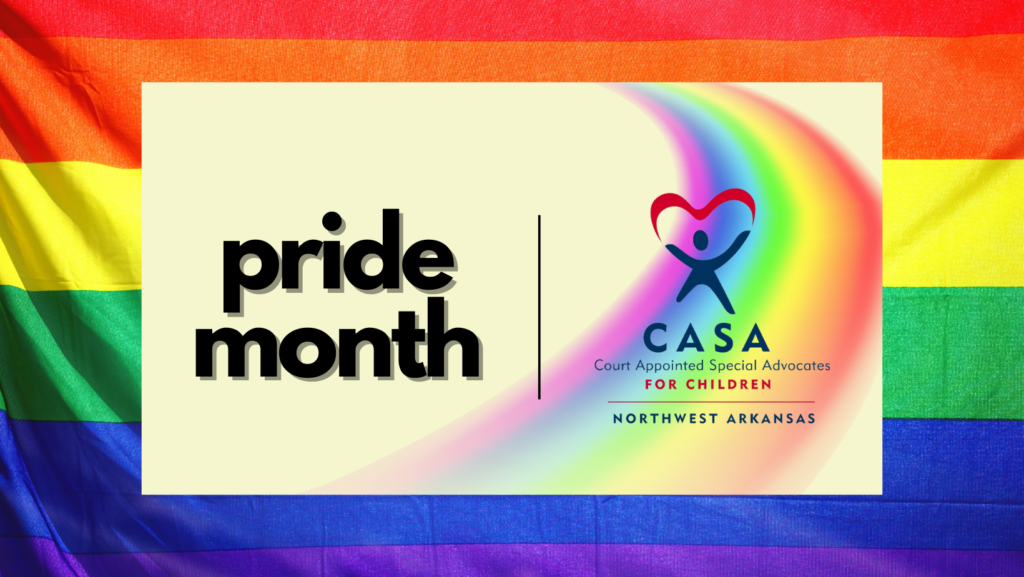
LGBTQI+ Youth in the Foster Care System
Pride Month is about recognizing our collective humanity, where everyone is treated equally no matter how the people in our communities identify. At CASA of NWA, if there is a child in need, we will have a volunteer ready to advocate for their best interest, no matter what. The way in which any particular youth identifies simply does not negate the support and compassion kids need to grow, let alone their right to basic needs and access to resources.
LGBTQI+ youth enter foster care for similar reasons as other children and youth; regardless of the situation, the birth families or legal guardian were not able to provide a safe and stable home for the child. The exception is often the rejection LGBTQI+ youth face from their families. They are especially at risk of abuse and neglect, often after disclosing their identity or questioning status to their family members, which can lead to alternative placements or homelessness.
LGBTQI+ are also overrepresented in foster care. This means that the percentage of youth in foster care that identify as LGBTQI+ is larger than the percentage of LGBTQI+ youth in the general youth population. A study in 2019 found youth that identify as LGB or unsure made up 11.2% of 12–18-year-olds, compared to 30.4% of the same group in foster care. LGBTQI+ are also more likely to be victimized or abused sometimes within the foster care system as well, which is further associated with poorer functional outcomes and a lack of permanency. LGBTQI+ are also often faced with verbal and/or physical violence because of their gender identity, which can then lead to multiple disrupted placements, compounding the trauma of navigating foster care in the first place.
This is precisely the reason our advocates are there by every child’s side—so they can look out for these issues and make sure their child’s needs are met and can work toward finding permanency. Not only do we try to recruit volunteers that identify as LGBTQI+ so we can better pair them with similar youth, but we also provide LGBTQI+ training to all our advocates throughout the year.
To show our support this pride month, we have compiled a list of both community and national resources for LGBTQI+ members, as well as others who’d like to learn more!
Local NWA Resources
- PFLAG NWA Community Resource Page
- NWA Equality Community Resource Page
- NWA Pride Parade- Saturday, June 18 2022
Nationwide Resources
- Human Rights Campaign– Research/Advocacy/Lobbying Organization; wealth of information
- GLAAD– LGBTQ+ media representation
- SPART*A– LGBTQ+ military servicemembers’ advocacy
- SAGE– LGBTQ+ elderly advocacy
- PFLAG– LGBTQ+ ally organization
- National Center for Lesbian Rights– LGBTQ+ litigation, legislation & policy advocacy
- LGBT National Health Center– Nation hotline- peer counseling, info, resources, online chat, resource database- 1-(888)-843-4564
Transgender/Intersex
- Transgender Law Center– Advocacy for trans rights and equality
- TransLifeline– Free 24/7 hotline for trans youth- (866)-488-7386
- National Center for Transgender Equality– Transgender advocacy
- interACT– Intersex advocacy and awareness group
Youth
- The Trevor Project– Free 24/7 hotline for LGBTQ+ youth
- It Gets Better Project– LGBTQ+ youth awareness campaign
- LGBT National YouthTalkline– Free phone, chat, & email for LGBTQ+ youth- (800)246-PRIDE
- The Ali Fortney Center– LGBTQ+ youth organization
Academic/Government
- LGBTQ+ Youth in Child Welfare System- youth.gov
- Baums, et. al (2019)- LGBTQ Youth in Unstable Housing and Foster Care- American Academy of Pediatrics
- LGBTQ+ Health & Well-Being– U.S. Department of Health & Human Services
Sources Used Here
- Baums, et. al (2019)- LGBTQ Youth in Unstable Housing and Foster Care- American Academy of Pediatrics
- LGBTQ+ Youth in Child Welfare System- youth.gov
- LGBTQ Youth in the Foster Care System
- Profiles in Pride– Compiled many of the sources above